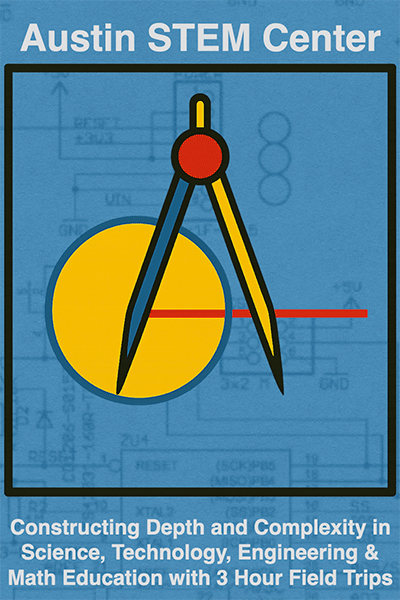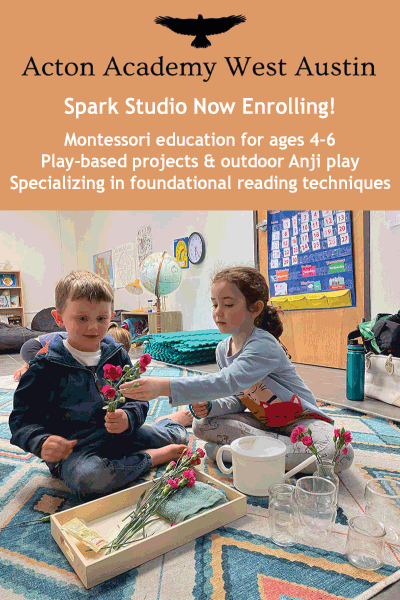“A way of learning that’s full of connections”: Socratic discussion in Austin’s alternative schools
/One of the most inspiring forms of learning I’ve encountered is Socratic discussion (sometimes called Socratic dialogue or Socratic seminar). Yet I often find myself in consultations struggling to adequately describe it to families who've never experienced it themselves or seen it in action. So I suggested that our staff writer-researcher, Shelley Sperry, delve into some local versions of the Socratic method with the help of students who love it. Here’s what she learned from them.
A Socratic discussion at Acton Academy
I remember my old high school was so divided. You were an island. But Socratic is a way of learning that’s full of connections.
—Cade Summers, KoSchool
Socratic discussions are powerful ways for students to help each other explore ideas, values, and opinions on important political, social, philosophical, and artistic issues. The Socratic method originated, as the name suggests, in ancient Greek philosophers’ methods of teaching and learning. Today, in some of Austin’s alternative schools the focus of “Socratics,” as students often call them, is on listening to all members of the group and finding common ground and new approaches, rather than trying to persuade or rigorously debate. During Socratics students try to develop a shared understanding of a particular essay, poem, or problem through analysis and creative interpretation, but the goal is never winning or losing a point but rather deepening the students’ own thinking.
As a newcomer to this way of learning, I wanted to understand how various students employ Socratic discussion in daily practice, so I interviewed three students who are fans of it. I am deeply grateful for the time they took to talk with me. I came away impressed by their ability to reflect on their own learning and communicate with a novice like me. The students I interviewed are Jesse Estes, age 18, who attends Skybridge Academy; Sam Sandefer, age 14, who attends Acton Academy; and Cade Summers, age 18, who attends KoSchool.
I learned through these interviews that the three schools’ Socratic programs have much in common as well as some differences. For example, Skybridge Socratics place emphasis on drawing personal connections to the issues and ideas under discussion. At Acton, focused Socratic discussions often explore ongoing, overarching themes like the “Hero’s Journey,” but Socratic questioning also takes place throughout the school day. KoSchool’s Socratic courses, much like college seminars, encourage students to delve deeply into complex texts and write clearly about them. I’ve edited my conversations with the three students to make these connections and subtle differences among their schools’ approaches clearer.
A Socratic discussion at Skybridge Academy
How would you define or explain Socratic discussions for a total newcomer?
Jesse: It’s an open-ended dialogue where you make sure everyone has a voice, and the goal is less important than the process.
Cade: Socratic is a more personal way to learn. Even if the group is divided somewhat in terms of the points everyone is making, you’re always connecting and learning from other people.
Sam: It’s really about learning to ask questions instead of giving and getting answers.
Can you talk about how the discussions work in practice? What’s a typical Socratic like?
Jesse: In our school, the student leader or the teacher/guide has a topic or question to consider, but then the floor is open to all students. Groups vary in size, but it’s usually about 10–12 people, which I think is optimal. We sometimes have as few as five people, but then discussion is slower. We each voice our thoughts in response to what someone else has said. Sometimes in philosophical discussions people do take sides, but in a lot of discussions there aren’t sides—there’s more of a spectrum. We do things mostly freeform and orally, but there is a whiteboard if someone needs to illustrate a point.
Cade: We practice Socratic dialogues in normal classes every day and I also host a “Bonus Socratic” after school. We usually have around 6 people, but it can be as few as 4 or as many as 11. The number doesn’t matter once you have a group that functions well. Michael—we call him a guide, not a teacher—often brings in a text, but students bring in poems and articles too. We might read the text, or part of it, to start the discussion. Then students just start sharing ideas.
Sam: We weave Socratic discussions through the day, not just in one particular time period. When you ask questions, you usually don’t just get one answer, you get another question to help lead you to an answer. So for example, if I ask someone about a math problem, instead of telling me the specific answer, the person might say: “What do you think the first step is in finding the answer?” Or they might say, “Could you try this? Or could you try that?”
Do you have any favorite discussions or moments during discussions in the past year?
Jesse: One of the best questions we had—and one that people kept talking about after class, like a running joke, was: If you have a boat and you take away one piece each year and replace it, until every piece is replaced, at what point do you have a new boat? We talked about this for three hours with no conclusion, but everyone participated and people changed opinions, and then kept talking about it after class.
Cade: I remember at one discussion a friend of mine was feeling a lot of anger coming into it, but having the Socratic turned the way he was feeling around. Discussion can help you alleviate some stresses because you can say what you’re thinking about issues—political or social or other things—and you can get some different contexts from other people and see things in a different light.
A Socratic discussion at KoSchool
Finally, what’s the value of Socratic discussion for you, carrying forward after high school or with your family and community?
Jesse: You learn how to draw people into conversation and to really listen to and understand their points of view. I think I have a much stronger voice than I had earlier, and my perspective is wider. We’re encouraged to lead our own discussions during the semester, so you also gain leadership skills, and now I’m leading my own class. It’s inspired me to look at something related to leadership and teaching when I go to college.
Cade: Learning how to discuss and communicate is invaluable. I definitely spoke more when I started, but I’ve learned gradually to be more introspective and really listen. I think at home I take a more introspective approach now, too, and work on my ability to empathize and understand other people, including my younger brother.
Sam: I think it’s made me much more independent—so rather than relying on someone else to give me answers, I want to find them on my own.
Shelley Sperry
















